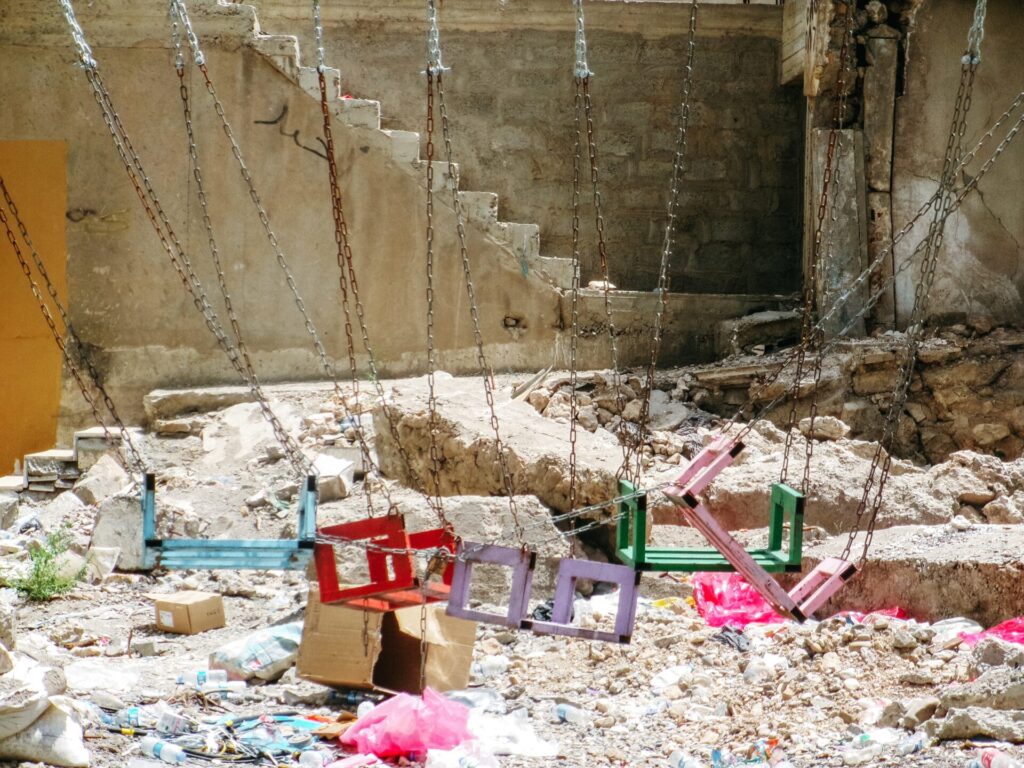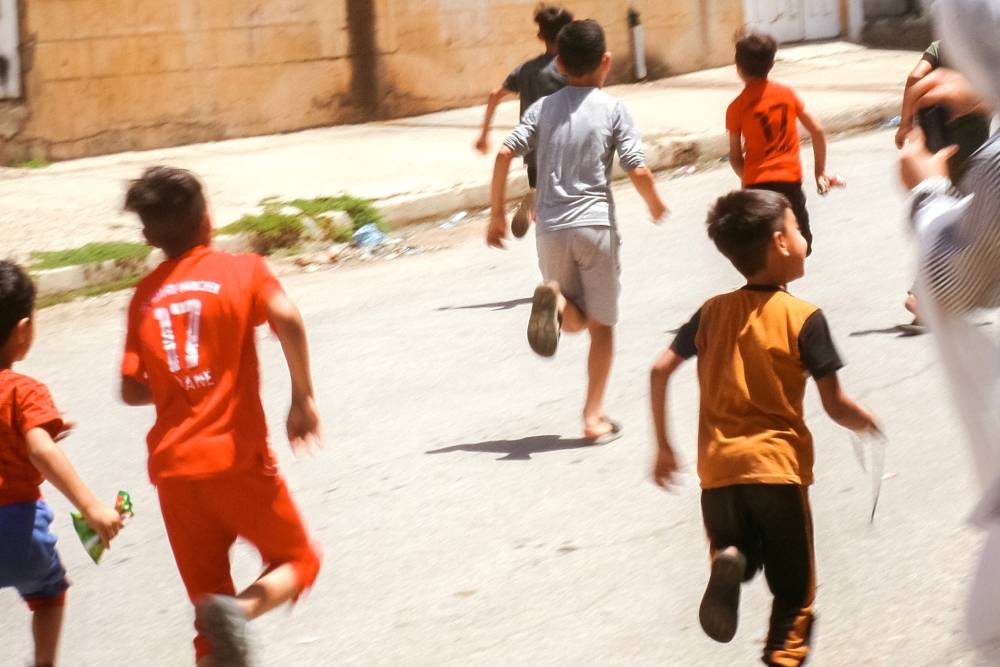We are the largest group affected by war in the world and the least likely to be heard. That’s the reality of young people today.
In 2024 alone, over 41,370 grave violations were committed against children living in conflict including killing, maiming and the recruitment of child soldiers. UNICEF estimates that more than 473 million children – one in six worldwide – are living in areas directly affected by violence.
In many conflict-affected contexts, youth make up the majority of the population and are disproportionately impacted by violence (e.g. in Gaza, nearly 70% of the population is under 30). Despite the impact of war on young people, children and youth are rarely heard or seen in the rooms where peace is discussed and decisions are made.
Our exclusion from peace processes isn’t just a missed opportunity – it is what allows cycles of violence to continue. This is not only a policy failure; it is a moral one.
Behind the numbers
But behind these statistics are real lives and voices – like that of Kawthar, a young woman from Iraq, who shares her story:
My childhood memories of Mosul echo the sounds of war, the loss of security, and the departure of many of my family members. I would wake up every day in fear, and sometimes the sounds of explosions would visit me in my dreams, waking me up terrified. Many of those around me disappeared, and our home was transformed into a painful void. Eventually, we were forced to leave our home and live in a camp – suffocating in the heat – where I witnessed things no child should ever see. My suffering didn’t end with the end of the war. I wasn’t to blame for what happened, but I lived it. I abandoned my studies and dreams. Everything I once loved felt heavy. Still, I carried a lot of pain inside me, but it turned into a motivation to continue, and to tell the world: I am here, despite everything.
Kawthar Younis, 21-year-old, Mosul, Iraq
Kawthar’s story is one of many that rarely make the headlines. But her message echoes far beyond Iraq.
Shared struggles, shared strength
In Malawi, I have witnessed a similar truth. I‘ve seen firsthand the toll of war in the region. I have met young people fleeing violence in Mozambique, Rwanda and Burundi – their dreams interrupted, but not lost. In my work in refugee camps, I have listened to their stories. These experiences shaped my conviction that young people are not just survivors of conflict, they are leaders in the pursuit of peace.
How conflict has manifested in our homelands is different, but many of our experiences are the same. Kawthar reflected, “Young people were mentioned in plans, but our real opinions are rarely heard. We know our pain better than anyone. We understand our streets and the tragedies of our homes. So why are our voices excluded when solutions are made?”
While most youth is disregarded in peacebuilding, Kawthar and I have been lucky to have some opportunities and we’ve seen the transformative power of including young people in discussions in building peace. In 2022, I co-founded the Clean Cities Project in Lilongwe, Malawi, originally focused on climate action and youth empowerment. Over time, our work evolved to include peacebuilding, recognizing the deep connections between climate security and resource-based conflict. To help prevent young people from being drawn into cycles of violence, we mobilized and trained youth in green skills, equipping them with tools for economic empowerment.
In 2023, Kawthar joined a photography and research programme in Mosul, organized by UNIDIR, 100cameras, War Child, and UNICEF.
It was the first time I held a camera, but the goal wasn’t just to take pictures; it was much deeper. Every photo I took carried something my words couldn’t express. Photography gave me a voice. The camera was like a translator for my heart. A year later I returned as a facilitator, helping other young people express their feelings through their lenses. I no longer felt alone – I was now capable of supporting others, just as I wished someone had supported me at the beginning of my journey.
Kawthar Younis

Reframing the narrative
Through photography, I tried to challenge the image of Mosul as only a city of war. I saw something else: Children laughing despite the devastation, mothers enduring fatigue and loss, and broken young people building hope from rubble. My photos carried a message: We are not finished. And we will not finish.
Kawthar Younis
Kawthar and I have both seen the power of photography and storytelling. They are universal languages that transcend literacy, status and borders. A single photograph can document injustice, reimagine futures, and humanize lives that policy and politics frequently overlook.
This belief is what drives Youth Visions of Peace, a global campaign launched by UNIDIR in partnership with 100cameras and War Child. It invites young people worldwide to share photos that reflect their own visions of peace – grounded in experience and hope. This is not a competition, but a platform for authentic expression. A diverse panel of youth and experts will curate submissions, which will be featured across global platforms and exhibitions.
A call for structural change
But we need more than visibility. We need structural change.
It’s time for governments, civil society, and global institutions to step up by creating safe platforms where youth can express themselves, be heard, and shape peace and security policies. This also means rethinking how we engage citizens – especially young people – by meeting them where they are and embracing the diverse ways they choose to communicate, whether through photography, storytelling, digital media, or other creative expressions. Remember, “Peace cannot be built without us. Don’t build our future without hearing our voices.”
So, young people everywhere: This is your invitation. Use your lens. Tell your truth. Let the world see your vision.
Because peace is not only what leaders sign into law – it is what young people like you dare to build, every single day, even in the shadows of war. As Kawthar says, “…peace is not just the absence of war. It’s walking without fear and returning home without seeing sadness fill my mother’s eyes. Peace is having my voice and future in my own hands.”
___________________________________________________________________________________________________________________________________________________
Amos Benjamin is a Graduate Professional at the United Nations Institute for Disarmament Research (UNIDIR). He holds a Bachelor’s degree in Environmental Health from the University of Malawi and has worked closely with the national government on participatory research initiatives. He is passionate about developing child-sensitive methodologies to amplify youth voices in peacebuilding and reintegration efforts.
Kawthar Younis is a 21-year-old from Mosul, Iraq. Currently in the fifth grade of middle school, she is developing a small project on Instagram that reflects her creativity and determination. Looking ahead, Kawthar aspires to pursue a career in the medical field and dreams of one day owning her own bookstore.
